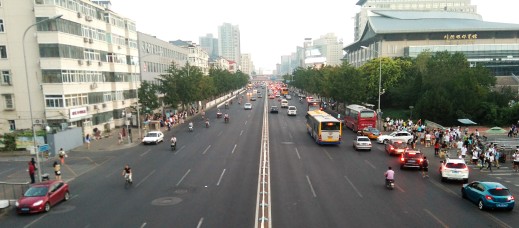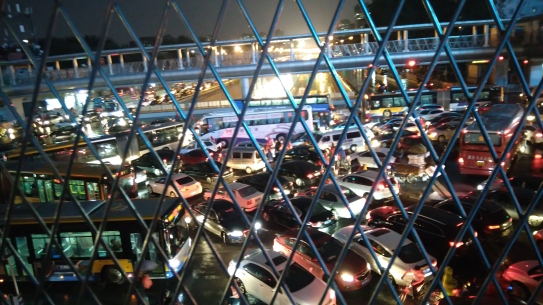-Wadeisor Rukato
Standing at the side of the road, I watch as cars, bicycles and buses transport the people of Beijing to wherever it is they are going. My particular interest is in the yellow and blue, sometimes yellow and red, sometimes yellow and green taxis. For a reasonable rate, these taxis transport people across the city quickly (in off-peak hours) and comfortably. It has been estimated that there are approximately 66000 taxis in operation in and around Beijing. Given the size of the city and the scale of potential demand, 66000 seems like an absurdly small number.

I keep my eyes open for a taxi with a red light shining in the area near the rear-view mirror. The red light indicates that the taxi is available. Having spotted the flash of red, I flag down the taxi, alerting the Shifu that I would like her/him to stop the vehicle.
Shifu (师傅) is a Chinese word that is used as the title for a skinful person or a master. It is used to “denote one’s respect for the skills and experience” of the person that the term is used to address. It is the term frequently used when addressing cab drivers and other skilled laborers in Beijing.
“Ni hao Shifu”, the conversation often begins, as I tell the driver where it is I want to go while I suss out whether she/he is talkative or taciturn. Mood permitting, I generally relish the opportunity to strike up conversations with the drivers I encounter. When they are open to conversation, there is a lot to learn and the human exchange can be enlightening. This is in addition to the safe space that is created for me to practice my Chinese with little regard for potential errors, or the awkward pauses in conversation that occur when I need to search for the Chinese translation of a word on Pleco.

“Ni shi na guo ren?”- What country are you from? This is one of the most frequently asked introductory questions. “Wo shi Jinbabuweiren” I reply, telling the driver that I am from Zimbabwe. Given my response, one of two things generally happen; the driver asks where Zimbabwe is, or she/he nods and utters confirmatory statements that indicate she/he, in fact, knows where this country is. This is a good starting point for my cab ride conversations because I can then inquire about how much the driver knows about African countries, if at all. “Shifu, Jinbabuwei shi Feizhou de guojia. Ni zhidao Feizhou ma?”- Zimbabwe is an African country, do you know about Africa?
Some drivers do and some don’t. The conversation is less superficial when they do. In such cases, the driver will name one or two other African countries she/he has heard of. Nanfei, or South Africa, is the popular choice in this regard. Other times Shifu will mention the names of popular heads of state; Mandela and Mugabe have received the highest number of mentions so far. In other instances, the driver will let me know that Africa is very hot and probably doesn’t have seasons. I particularly enjoy asking Shifu if she/he has ever been to Africa, just to observe the response since it is quite unlikely that the answer would be ‘yes’.
One of my most notable conversations with a Beijing taxi driver is a short exchange on my way to a café near campus recently. During my ‘familiarity with Africa’ round of questioning, I said to the driver, “Hen duo Zhongguoren zhu zai Nanfei de guojia, ni zhiddao ma?”- A lot of Chinese people live in African countries, did you know this? Shifu smiled and nodded, before letting me know that he was indeed aware of the steady increase in Chinese migration to African countries. My interest was piqued. Before I could squeeze in another question, he continued, “Feizhou you hen duo qian”- There is a lot of money in Africa. I was both stunned and impressed by this statement. Stunned because, contrary to the driver’s statement, extreme poverty has been a pervasive stereotype of African countries since I arrived in Beijing. Impressed, because I have generally assumed that only a few Chinese people are aware of the increasing numbers of Chinese migrants who find the potential economic opportunities in African countries attractive.
“Are you from Beijing?” is the next question I ask when we have finished speaking about Africa or Zimbabwe. Some of the drivers are, and others are migrant workers from Hebei and other provinces. In the context of the social, economic and political issues related to China’s migrant workers, it is always interesting to know how far away some of the drivers have come from just to get to Beijing. When I ask if they like Beijing, the response is generally positive, something I have grown increasingly skeptical about.
I recently had an interesting conversation with a driver on my way back from a night out with friends in one of Beijing’s hutongs. Our conversation had turned to the topic of race. In my chopped up Chinese, I asked the driver about the frequency and nature of his experiences with “hei ren”, or black people. His response was that the blackness or non-blackness of the people he meets doesn’t matter; it is what is inside that matters, and that determines whether a person should be likable or not. I wish I had bottled his response so that I could share his message in the exact words he used. When the ride home ended I felt ‘super grateful’ for the exchange had.

“Wo keyi he weixin fu ma”- can I pay for the ride with WeChat? Cab rides and conversations generally end with this question. Depending on whether Shifu is “with the times”, I will scan a QR code on her/his phone and pay the required amount using the money in my WeChat wallet. I have a huge appreciation for the taxi services in Beijing . On one hand, they are both accessible and affordable. I’m often made to think of how the same service in Harare or Zimbabwe is a luxury reserved only for special occasions. As I continue to converse with the individuals who drive these taxis, however, I am learning to appreciate the service for a different reason. Whether long or short, interesting or dull, conversations with ‘Shifu’ have generally left me feeling reflective about how people in big Beijing are experiencing life, constantly highlighting how simultaneously similar and different we all are.


I loved every bit of it.
LikeLiked by 1 person
Thank you for reading Ele!
LikeLike
So thoughtful and well written. -John
LikeLike
Thank you John! We are very happy you stopped by.
LikeLike
Just came back to read this post. Still one of my favorite posts. The spirit of the conversation is live and active, I can reimagine it all. You’re a stunning & thoughtful writer Wadeisor.
LikeLike